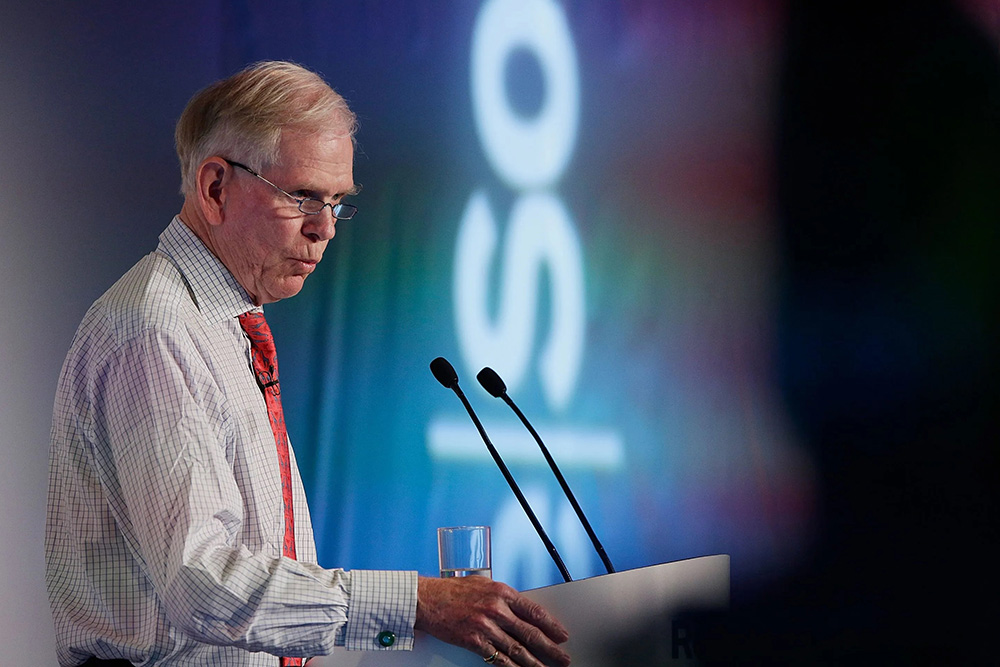
杰里米·格蘭瑟姆是華爾街最受尊敬的投資者之一。
格蘭瑟姆是位于美國波士頓的資產管理公司GMO的聯合創始人,他曾經因為成功預測20世紀80年代的日本資產價格泡沫、90年代末的互聯網泡沫和2008年金融危機前的美國房地產泡沫而名聲大噪。
而現在,這位已經83歲的華爾街大佬卻表示,盡管今年美股遭遇劇震,但真正的經濟下行尚未到來。格蘭瑟姆一直警告美國經濟正在醞釀一個“超級泡沫”,他認為現在這個泡沫仍未挑破。
在8月31日的一份研究報告中,格蘭瑟姆指出,當前的美股價格仍然“非常昂貴”,而且以歷史經驗看,像當下正在經歷的這種高通脹,必然會導致股市價格縮水。再加上近幾個月,歐洲的能源危機、全球性的食品安全問題、美聯儲(Federal Reserve)的大幅加息,以及全球性的政府支出放緩,全球經濟的“基本面”已經開始“嚴重惡化”。
他在文中寫道:“當前的超級泡沫表現出一種前所未有的危險性,包括各種資產估值過高的問題(比如債券、住房和股票價格都被嚴重高估,而且正在迅速失去勢頭)、大宗商品震蕩的問題,以及美聯儲的鷹派立場問題。雖然每一輪經濟周期都有其獨特性,但是歷史經驗表明,最糟糕的時候還沒有到來。”
格蘭瑟姆堅持認為,在過去十年間,美聯儲和其他國家央行采取的寬松貨幣政策(例如近接于零的利率政策和量化寬松等),導致全球資產價格形成了一個“超級泡沫”,催生了一個投資者的狂歡時代。但當狂熱成為一種普遍現象時,崩潰也就不遠了。
格蘭瑟姆也不認同今年夏天的股市反彈標志著一輪新牛市的開始。他指出,以歷史經驗看,在“超級泡沫”的消化過程中,總會出現幾次短暫的市場回升。
他說:“超級破沫不同于其他事件,雖然歷史上可供投資者研究的‘超級泡沫’不多,但它們也有一些明顯的共同特征,其中之一就是熊市的反彈……今年夏天的反彈迄今完全符合這種模式。”
除了格蘭瑟姆之外,華爾街有多位老將也發表過類似的言論,包括摩根士丹利(Morgan Stanley)的首席投資官邁克·威爾遜。威爾遜認為,今年6月以來的熊市反彈只不過是誘導投資者的一個“陷阱”(不過威爾遜并未將市場稱作“泡沫”)。
格蘭瑟姆還解釋了一個“超級泡沫”破滅所要經歷的典型階段,并指出當前的經濟環境已經非常符合歷史模式。
“首先是泡沫的形成。其次是政治經濟環境出現一些動蕩,導致投資者意識到那種完美是無法持久的,就像今年上半年那樣,這時估值就會有所下降。再次就是我們最近看到的——熊市反彈。第四也是最后,就是基本面的惡化,市場跌至低點。”
格蘭瑟姆繼續指出,今年上半年股市下跌的主要推手是通脹,而今年全年股市下跌的主要原因,則是企業利潤的下降。不過最后,他對自己的預測也是有所保留的。
“如果熊市真的已經結束了,那么歷史上美國超級泡沫的演變模式就將完全被打破——雖然到目前為止,這次超級泡沫的演變模式與歷史經驗如出一轍。但這也是可能的。每一輪經濟周期都有其獨特性,而且每個政府的反應都是不可預測的。但如果歷史重演,這出戲就仍然將以悲劇結尾。我們只能希望這一次造成的損害可以小一些。”(財富中文網)
譯者:樸成奎
杰里米·格蘭瑟姆是華爾街最受尊敬的投資者之一。
格蘭瑟姆是位于美國波士頓的資產管理公司GMO的聯合創始人,他曾經因為成功預測20世紀80年代的日本資產價格泡沫、90年代末的互聯網泡沫和2008年金融危機前的美國房地產泡沫而名聲大噪。
而現在,這位已經83歲的華爾街大佬卻表示,盡管今年美股遭遇劇震,但真正的經濟下行尚未到來。格蘭瑟姆一直警告美國經濟正在醞釀一個“超級泡沫”,他認為現在這個泡沫仍未挑破。
在8月31日的一份研究報告中,格蘭瑟姆指出,當前的美股價格仍然“非常昂貴”,而且以歷史經驗看,像當下正在經歷的這種高通脹,必然會導致股市價格縮水。再加上近幾個月,歐洲的能源危機、全球性的食品安全問題、美聯儲(Federal Reserve)的大幅加息,以及全球性的政府支出放緩,全球經濟的“基本面”已經開始“嚴重惡化”。
他在文中寫道:“當前的超級泡沫表現出一種前所未有的危險性,包括各種資產估值過高的問題(比如債券、住房和股票價格都被嚴重高估,而且正在迅速失去勢頭)、大宗商品震蕩的問題,以及美聯儲的鷹派立場問題。雖然每一輪經濟周期都有其獨特性,但是歷史經驗表明,最糟糕的時候還沒有到來。”
格蘭瑟姆堅持認為,在過去十年間,美聯儲和其他國家央行采取的寬松貨幣政策(例如近接于零的利率政策和量化寬松等),導致全球資產價格形成了一個“超級泡沫”,催生了一個投資者的狂歡時代。但當狂熱成為一種普遍現象時,崩潰也就不遠了。
格蘭瑟姆也不認同今年夏天的股市反彈標志著一輪新牛市的開始。他指出,以歷史經驗看,在“超級泡沫”的消化過程中,總會出現幾次短暫的市場回升。
他說:“超級破沫不同于其他事件,雖然歷史上可供投資者研究的‘超級泡沫’不多,但它們也有一些明顯的共同特征,其中之一就是熊市的反彈……今年夏天的反彈迄今完全符合這種模式。”
除了格蘭瑟姆之外,華爾街有多位老將也發表過類似的言論,包括摩根士丹利(Morgan Stanley)的首席投資官邁克·威爾遜。威爾遜認為,今年6月以來的熊市反彈只不過是誘導投資者的一個“陷阱”(不過威爾遜并未將市場稱作“泡沫”)。
格蘭瑟姆還解釋了一個“超級泡沫”破滅所要經歷的典型階段,并指出當前的經濟環境已經非常符合歷史模式。
“首先是泡沫的形成。其次是政治經濟環境出現一些動蕩,導致投資者意識到那種完美是無法持久的,就像今年上半年那樣,這時估值就會有所下降。再次就是我們最近看到的——熊市反彈。第四也是最后,就是基本面的惡化,市場跌至低點。”
格蘭瑟姆繼續指出,今年上半年股市下跌的主要推手是通脹,而今年全年股市下跌的主要原因,則是企業利潤的下降。不過最后,他對自己的預測也是有所保留的。
“如果熊市真的已經結束了,那么歷史上美國超級泡沫的演變模式就將完全被打破——雖然到目前為止,這次超級泡沫的演變模式與歷史經驗如出一轍。但這也是可能的。每一輪經濟周期都有其獨特性,而且每個政府的反應都是不可預測的。但如果歷史重演,這出戲就仍然將以悲劇結尾。我們只能希望這一次造成的損害可以小一些。”(財富中文網)
譯者:樸成奎
Jeremy Grantham is among Wall Street’s most respected investors.
The cofounder of Boston asset manager GMO is well known for having predicted Japan’s asset price bubble in the 1980s, the dot-com bubble of the late ’90s, and even the U.S. housing blowup that came before the 2008 financial crisis.
Now the 83-year-old Wall Street veteran is arguing that despite the stock market’s struggles this year, the economy’s real downturn has yet to come. Grantham has been warning of a brewing “superbubble,” and he says it’s yet to pop.
In a August 31 research note, the investor noted that stocks remain “very expensive” and high inflation like the economy is experiencing now has historically led their valuations to contract. He also claimed that global economic “fundamentals” have begun to “deteriorate enormously” in recent months, pointing to the energy crisis in Europe, global food insecurity, Federal Reserve interest rate hikes, and slowing government spending worldwide.
“The current superbubble features an unprecedentedly dangerous mix of cross-asset overvaluation (with bonds, housing, and stocks all critically overpriced and now rapidly losing momentum), commodity shock, and Fed hawkishness,” Grantham wrote. “Each cycle is different and unique—but every historical parallel suggests that the worst is yet to come.”
Grantham has consistently argued that the loose monetary policies of the Federal Reserve and other central banks, including near-zero interest rates and quantitative easing, helped create a “superbubble” in asset prices worldwide over the past decade, spawning an era of investor euphoria. And when euphoria becomes common, a collapse is usually around the corner, he argues.
Grantham also doesn’t buy the idea that the stock rally this summer marked the start of a new bull market, noting that “superbubbles” have historically featured brief market rallies.
“Superbubbles are events unlike any others: While there are only a few in history for investors to study, they have clear features in common,” he wrote. “One of those features is the bear market rally… This summer’s rally has so far perfectly fit the pattern.”
His comments echo statements made by multiple Wall Street veterans, including Morgan Stanley’s chief investment officer Mike Wilson, who has been arguing the bear market rally is nothing but a “trap” for misguided investors since June (although Wilson stops short of calling the market a bubble).
Grantham went on to explain the typical stages that superbubbles go through when they collapse, noting that the current economic environment looks very similar to the historical pattern.
“First, the bubble forms; second, a setback occurs, as it just did in the first half of this year, when some wrinkle in the economic or political environment causes investors to realize that perfection will, after all, not last forever, and valuations take a half-step back. Then there is what we have just seen—the bear market rally. Fourth and finally, fundamentals deteriorate and the market declines to a low,” he wrote.
Grantham also elaborated on how rising inflation was the key driver of stock market declines in the first half of the year, but falling corporate profit margins will be the main cause of losses through December. He ended his research note with an important caveat about his prediction, however.
“If the bear market has already ended, the parallels with the three other U.S. superbubbles—so far so strangely in line—would be completely broken. This is always possible. Each cycle is different, and each government response is unpredictable,” he said. “But…if history repeats, the play will once again be a Tragedy. We must hope this time for a minor one.”






